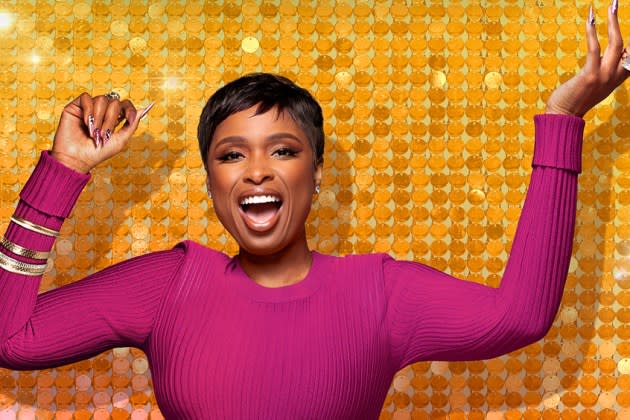‘The Jennifer Hudson Show’ Relies on Persona, Not Personality: TV Review
- Oops!Something went wrong.Please try again later.
- Oops!Something went wrong.Please try again later.
- Oops!Something went wrong.Please try again later.
- Oops!Something went wrong.Please try again later.

On the first episode of Jennifer Hudson’s new talk show, guest Simon Cowell was very gently criticizing the series “American Idol,” on which he had been a judge and Hudson had been a contestant. Remarking how he found the producers’ assignment for her to sing a Barry Manilow song (which she did the week she was sent home) to be unfair to her and outdated, Cowell generated the first semblance of real heat on the episode. Here was something, perhaps, with the frisson and excitement of real conversation. Hudson let it sit there, allowing a couple moments of silence before remarking “Simon being Simon,” then trailing off.
This first episode began with a run-through of Hudson’s career achievements: From the sorrow of her “Idol” elimination during Barry Manilow Week to her casting in “Dreamgirls,” for which she would win an acting Oscar, to her successful recording career. Hudson has won all four major entertainment awards — an EGOT, which speaks to the somewhat mythic place she occupies in the celebrity landscape: The recipient of a second chance whose unabashedly showy voice couldn’t be constrained by a reality-show loss.
More from Variety
As the first week of her new talk show winds down, however, it seems apparent that Hudson’s fame and her persona as a somewhat unknowable old-school songstress are incompatible with the daytime-talk format. She’s a boundlessly talented performer who, in monologuing for an audience or chatting with guests, seems apparently holding something of herself back.
The format here will come as no surprise to anyone who has followed the long search for a successor to Ellen DeGeneres as queen of daytime: Indeed, “The Jennifer Hudson Show” is produced by Mary Connelly, Andy Lassner and Corey Palent of “The Ellen DeGeneres Show,” and is a production of Warner Bros., DeGeneres’ longtime home. The show features gentle-to-the-point-of-imperceptible celebrity interviews, as well as human-interest segments. In one, Hudson visits a convenience-store chain to reward its customers with big checks, alternating incantatory repetitions of the chain’s brand name with a sort of stunned performance of humility that her public recognizes her. In another, a bridal party minus one bridesmaid visits the set, and they are pleasantly surprised when Hudson reveals that she flew the remaining bridesmaid in from Arizona. It seems like a nice day for the group, but it’s hard to understand why this made the air; even the bride seems more genial and pleased than blown away, although she dutifully lists the name of each wedding attendant when Hudson asks her to.
Hudson is a star who’s hard to miss, and segments in which she sings begin to make clear why that’s true: Her startlingly powerful voice sets her apart. But the simple fact is we know little very about Hudson. And that’s by design: She does not seek out the press and is, even on this show, tactical and controlled in what she lets us see. Her sister Julia appeared in the audience in the first “Jennifer” episode; in the subsequent two episodes, Hudson recapped that appearance in much the same way, down to referring to her sister as “the original J-Hud.” Multiple times we have been told that Hudson chooses coffee mugs with mantras that will inspire her for the day. (One reads “Radiate positivity.”)
Not every talk show host needs to be Wendy Williams, the say-everything personality whose show left the air last season amid a cloud of controversy. But there is a middle ground, or should be. (Indeed, in her own first episode this week, Williams’ replacement, Sherri Shepherd, kept the conversation light but showcased her sharp comic wit.) In Hudson’s class of major celebrities trying talk, Drew Barrymore has stuck it out by demonstrating a complete commitment to a sensibility that’s as genuinely offbeat as it is family-friendly. And Hudson’s fellow “Idol” alum Kelly Clarkson is, in her interviews, a true enthusiast whose passion seems to come from a place of having paid close attention to her favorites.
Hudson, by contrast, lacks a certain momentum in interviews; guests often end up steering the conversation more than they usually might, while Hudson praises them for being sharp or funny without following up with questions. Her conversation with “Ted Lasso” performer Hannah Waddingham, for instance, is completely driven by Waddingham; the role of a host in moments like this is, in part, to lend a sense of what it’s like to speak to the guest, and yet Hudson is giving too little to make this clear.
Daytime thrives on relatability, which is why it’s strange that so many megastars have been trying it lately; those who’ve succeeded did so by putting real consideration into what specific aspects of their stories they want to put forward. Whereas “The Jennifer Hudson Show” is vague, steering clear not merely of politics or of Hudson’s innermost personal life, which would be completely expected, but from any tension or interest as well. It takes as a starting point that the audience will be inherently intrigued by Hudson on their screen, forgetting, perhaps, that fame is only a starting point for a talk-show personality. Historically, the audience has made the host famous in exchange for all they give us. Hudson entering the arena needing little from her audience skews things: Positivity is a wonderful thing to radiate, but we need something more to grab onto for an hour each day.
Best of Variety
Sign up for Variety’s Newsletter. For the latest news, follow us on Facebook, Twitter, and Instagram.
